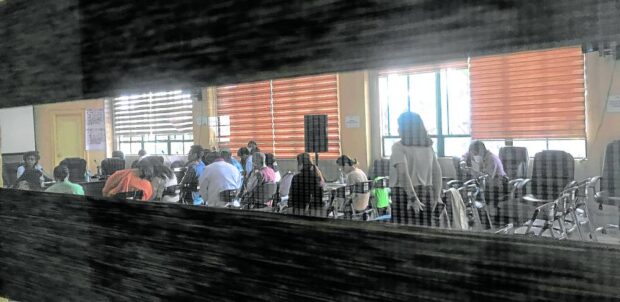
CORDILLERA STOP | United Nations Special Rapporteur Irene Khan listens to concerns raised by Red-tagged civil society groups in the Cordillera during her Baguio visit on Jan. 26, 2024.
(Photo by VINCENT CABREZA / Inquirer Northern Luzon)
BAGUIO CITY, Benguet, Philippines — The city government has asked a United Nations official to help stop red-tagging that has victimized not just local activists and journalists but also city officials who stepped up to protect them.
Lawyer Irene Khan, UN Special Rapporteur on Freedom of Expression and Opinion, was asked to facilitate “state accountability on Red-tagging and political vilification of people’s organizations and human rights defenders, including indigenous peoples,” according to a letter of concern signed by Vice Mayor Faustino Olowan and all 14 members of the city council.
The council’s position paper was released to Baguio news outlets on Tuesday, days after local officials met with Khan to discuss documented cases of local Red-tagging and the policies set up by the city government to protect activists during the Jan. 26 Baguio leg of her 10-day Philippine visit.
It also asked Khan for her support “for the passage of local and national legislation and mechanisms for the protection of freedom of speech and expression, and for the protection of human rights defenders and journalists.”
The council sought “technical support from the United Nations on protections and mechanisms for redress with regards to disinformation in cyberspace.”
Last month, the council rebranded Baguio as “an exclusive human rights city” through Resolution No. 763-2023.
During the council’s regular session on Monday, it discussed inputs from the police and the military regarding Proposed Ordinance No. 0026-23 or the draft measure which outlines mechanisms to “protect the rights and freedoms of human rights defenders” in Baguio.
The measure, which has passed second reading, is intended to “nurture a safe environment for political debate and dissent with the State as an essential aspect of democracy.”
Terrorist tag
Other measures cited included the city council’s Oct. 2, 2023, appeal to the Anti-Terrorism Council to spare local activists Sarah Abellon-Alikes, Jennifer Awingan, Windel Bolinget, and Stephen Tauli who were declared terrorists last year shortly after they were all acquitted of the criminal and rebellion charges filed by the military.
“However, these [official] actions have not spared us, Baguio City officials, from Red-tagging and disinformation,” the city council said, citing Lorraine Badoy’s 2022 online attack against Baguio Mayor Benjamin Magalong after the official directed the police to remove tarpaulins that identify and label college students as “communist rebels” or “terrorists.”
The mayor gave those instructions after holding a dialogue with the students and Baguio’s activist community in March 2022 where he assured them that they were safe in the city. Badoy, at that time, served as spokesperson for the National Task Force to End Local Communist Armed Conflict.
“In January 2023, Badoy (now a commentator for evangelist Apollo Quiboloy’s Sonshine Media Network International) and her cohost Jeffrey Celiz again accused the mayor of colluding with communist rebels,” the city council said.
It said Councilor Jose Molintas, a human rights lawyer, was included and then delisted from a proscription list of supposed communists that the Department of Justice (DOJ) had asked a court to declare terrorists in 2018. The Manila court hearing the case removed Molintas and former UN Special Rapporteur on the Rights of Indigenous Peoples Victoria Tauli-Corpuz from the list of 656 people. It later dismissed the DOJ petition.
That same year, Councilor Arthur Allad-iw was declared a communist sympathizer when he sponsored the council resolution urging the government to drop Baguio residents from the DOJ’s terrorist proscription lawsuit.
Media attacks
Khan also held a closed-door meeting with Baguio civil society groups, where the National Union of Journalists of the Philippines (NUJP) submitted case studies of Baguio journalists and media outfits.
These media workers were either harassed or maligned through Red-tagging or through libel complaints.
In Cebu on Monday, Khan met with the Central Visayas regional police and members of the Cebu Citizen’s Press Council and the Cebu Federation of Beat Journalists.
Lawyer Hue Jyro Go, chief of staff of the Presidential Task Force on Media Security, shared that Khan acknowledged the positive relationship between the police and the media in Cebu.
“She (Khan) was surprised and she was delighted that our Philippine National Police here adheres to international human rights standards. There are only a few exceptions when it comes to restraining speech or opinion—first when it’s against public morals or if it breaches the freedom of others and second when it comes to national security,” he said.
Lt. Col. Gerard Ace Pelare, spokesperson for the regional police, said Khan recommended that they hold a seminar for police officers to improve or promote media relations and security.
“We are doing that already but we will improve it more so that the transparency of police operations, accessibility of information will be sustained here in [the regional police],” he said.
Arnold Bustamante, president of Cebu Federation of Beat Journalists, said: “Press freedom is still alive. We have not experienced our mouths being shut, our hands being tied in writing the truth about any wrongdoing by our police or our government officials. We are free to write about it.”